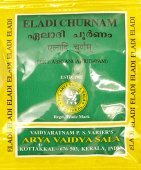Dhyamaka, Dhyāmaka: 5 definitions
Introduction:
Dhyamaka means something in Hinduism, Sanskrit, biology. If you want to know the exact meaning, history, etymology or English translation of this term then check out the descriptions on this page. Add your comment or reference to a book if you want to contribute to this summary article.
In Hinduism
Ayurveda (science of life)
Kalpa (Formulas, Drug prescriptions and other Medicinal preparations)
Source: Shodhganga: Edition translation and critical study of yogasarasamgrahaDhyāmaka (ध्यामक) refers to the medicinal plant known as “Cymbopogon martini (Roxb.) Wats” and is dealt with in the 15th-century Yogasārasaṅgraha (Yogasara-saṅgraha) by Vāsudeva: an unpublished Keralite work representing an Ayurvedic compendium of medicinal recipes. The Yogasārasaṃgraha [mentioning dhyāmaka] deals with entire recipes in the route of administration, and thus deals with the knowledge of pharmacy (bhaiṣajya-kalpanā) which is a branch of pharmacology (dravyaguṇa).

Āyurveda (आयुर्वेद, ayurveda) is a branch of Indian science dealing with medicine, herbalism, taxology, anatomy, surgery, alchemy and related topics. Traditional practice of Āyurveda in ancient India dates back to at least the first millenium BC. Literature is commonly written in Sanskrit using various poetic metres.
Biology (plants and animals)
Source: Wisdom Library: Local Names of Plants and DrugsDhyamaka [ध्यामक] in the Sanskrit language is the name of a plant identified with Valeriana pyrolifolia Decne. from the Caprifoliaceae (Honeysuckle) family having the following synonyms: Valeriana pyrolaefolia. For the possible medicinal usage of dhyamaka, you can check this page for potential sources and references, although be aware that any some or none of the side-effects may not be mentioned here, wether they be harmful or beneficial to health.

This sections includes definitions from the five kingdoms of living things: Animals, Plants, Fungi, Protists and Monera. It will include both the official binomial nomenclature (scientific names usually in Latin) as well as regional spellings and variants.
Languages of India and abroad
Sanskrit dictionary
Source: Cologne Digital Sanskrit Dictionaries: Monier-Williams Sanskrit-English DictionaryDhyāmaka (ध्यामक):—[from dhyāma] n. a [participle] kind of grass, [Suśruta; Bhāvaprakāśa]
[Sanskrit to German]
Sanskrit, also spelled संस्कृतम् (saṃskṛtam), is an ancient language of India commonly seen as the grandmother of the Indo-European language family (even English!). Closely allied with Prakrit and Pali, Sanskrit is more exhaustive in both grammar and terms and has the most extensive collection of literature in the world, greatly surpassing its sister-languages Greek and Latin.
See also (Relevant definitions)
Starts with: Dhyamakah.
Ends with: Madhyamaka.
Full-text: Eladi.
Relevant text
Search found 5 books and stories containing Dhyamaka, Dhyāmaka; (plurals include: Dhyamakas, Dhyāmakas). You can also click to the full overview containing English textual excerpts. Below are direct links for the most relevant articles:
The Agni Purana (by N. Gangadharan)
Sushruta Samhita, Volume 5: Kalpasthana (by Kaviraj Kunja Lal Bhishagratna)
Chapter II - Description of Sthavara (vegetable and mineral) poisons
Chapter VII - Description and preparation medicated drums
Sushruta Samhita, volume 1: Sutrasthana (by Kaviraj Kunja Lal Bhishagratna)
Sushruta Samhita, volume 4: Cikitsasthana (by Kaviraj Kunja Lal Bhishagratna)
Atharvaveda and Charaka Samhita (by Laxmi Maji)
1b. Study of Fever (Jvara) in the Caraka-Saṃhita < [Chapter 5 - Diseases and Remedies in Atharvaveda and Caraka-Saṃhitā]
Related products


